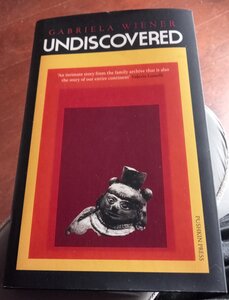In Undiscovered, we first meet Peruvian writer Gabriela Wiener in Paris, as she visits an exhibition of pre-Columbian artefacts that were taken to Europe by her Austrian-born great-great-grandfather, Charles Wiener. Her father’s death has spurred Gabriela on to investigate the legacy of that side of the family, and this is perhaps the most difficult part: the white ancestor who plundered her country.
As she tells it in the novel, Gabriela experiences a certain affinity with Charles in terms of his writing:
Isn’t that what writers do anyway? Pillage the real story and deface it until it shines its own singular light on the world? At some point, Charles started shining brighter than the world he swore he’d discovered, casting the world around him in his shadow. Scholars of his work agree that he was a travel writer, even though that’s wasn’t his intention and his work reads like fiction.
Translated from Spanish by Julia Sanches
Undiscovered could be seen as Gabriela-the-narrator’s way of trying to process and reconcile the different parts of her identity – not just her past, but also her present. Gabriela lives in Spain in a polyamorous relationship, but then has a fling on a trip back to Lima. One strand of the novel then follows Gabriela’s search for an equilibrium in her personal life. The intertwining of the personal and historical is, to my mind, what most animates Wiener’s novel.
Published by Pushkin Press.
Click here to read my other posts on the 2024 International Booker Prize.


Recent Comments